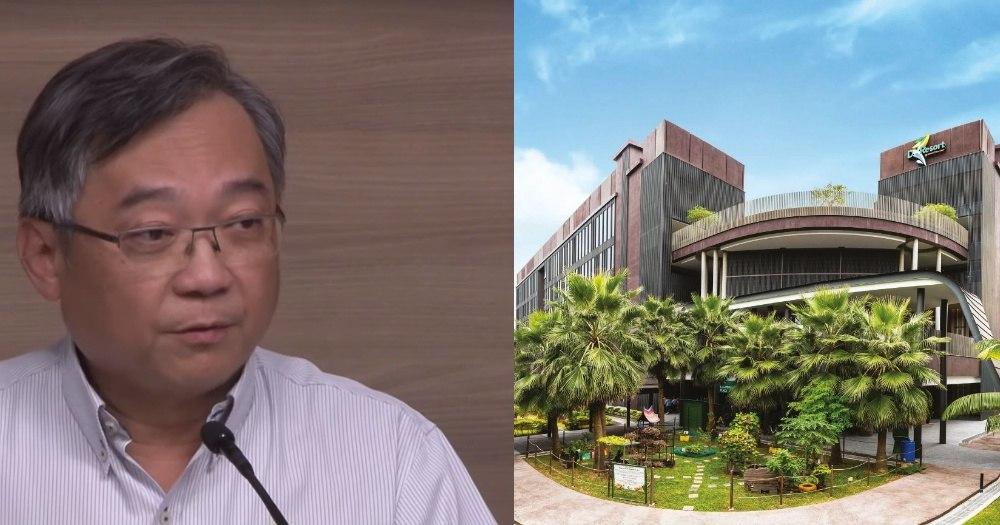The Ministry of Health (MOH) will progressively move Covid-19 patients who are experiencing milder symptoms out of public hospitals and into private hospitals and other care facilities, in order to preserve capacity in Singapore's healthcare system.
Patients with mild symptoms will after initial hospitalisation and assessment be shifted to a mix of private hospitals and converted Government Quarantine Facilities (GQFs), such as D'Resort in Pasir Ris, in order to focus Singapore's critical hospital resources on the seriously ill.
According to Minister for Health Gan Kim Yong, speaking about this in Parliament on Wednesday (March 25), this is in anticipation of potential further local clusters emerging, and also in view of the fact that 80 per cent of Covid-19 cases were mild to moderate, and therefore only require limited medical care.
Singapore previously admitted and kept every Covid-19 case into hospitals
In his speech, Gan said Singapore will no longer be taking a conservative approach to the epidemic, due to the significant number of imported cases from returning residents and visitors, which may lead to more localised transmissions.
Previously, all confirmed Covid-19 cases, regardless of severity, were admitted to our hospitals, and remained there until they were tested negative for the virus twice, over a duration of 24 hours.
According to Gan, this conservative approach was taken earlier on as there was little knowledge about the severity of Covid-19 at the time.
However, MOH is now aware that 80 per cent of Covid-19 cases were mild to moderate, with many patients in Singapore experiencing only mild symptoms, similar to the flu.
"They only require limited medical care, and what we need really are isolation facilities to prevent them from infecting others, until they are free of the virus," said Gan.
Patients in these facilities will continue to be closely monitored and repeatedly tested for the virus
MOH is currently collaborating with private hospitals such as Concord International Hospital and Mount Elizabeth Hospital, which have already begun accepting well and stable Covid-19 patients.
Some GQFs, such as the Pasir Ris D'Resort, will also be converted to become isolation facilities for these stable Covid-19 patients.
Gan said these patients will continue to be quarantined and closely monitored, so there is no risk of the general public being exposed to these cases while they are at these facilities.
He also emphasised that just like with cases that stay throughout in the hospital, patients will be closely monitored for symptoms and repeatedly tested for the virus.
"Only when they have fully recovered and tested negative for the virus twice over a period of 24 hours, will they be discharged back into the community. At this point, they no longer have any risk of transmitting the virus to others as they have fully recovered," said Gan.
He said that MOH will continue to explore the use of such isolation facilities for well and stable Covid-19 patients, in order to focus critical hospital resources on the seriously ill in order to minimise the number of fatalities.
That being said, he also promised that any Singaporean who requires medical care, whether for Covid-19 or otherwise, will receive the necessary treatment and care.
Singapore residents and long-term pass holders transferred to these facilities will continue to receive free-of-charge testing and treatment, except for those who have travelled overseas despite the travel advisory, and contracted Covid-19 while overseas.
Important to "flatten the curve" of Covid-19 cases
In his speech, Gan also spoke about Singapore's long-term Covid-19 strategy.
He said that while it is important to ensure sufficient healthcare capacity, it is "equally important to prevent new local clusters in the first place", in order to prevent a situation akin to Hubei and Italy, where an exponential growth in the number of infections quickly overwhelmed the healthcare system.
Hence, Singapore's strategy is to slow down the infection rate and maintain it at "as low a level as long as possible", as a lower infection rate will allow MOH to better conduct contact tracing efforts and quarantining of close contacts, which will prevent further spread of Covid-19 in Singapore.
In fact, he said the government has already expanded its initial three contact tracing teams to 20, pooling resources from various ministries and government agencies, including the Singapore Armed Forces.
Gan said also that they are now able to reach out to some 4,000 people in Singapore for contact tracing daily.
By introducing stringent safe distancing and other measures to slow down the infection rate, the number of Covid-19 cases will still grow, but the peak will be lower, if it is done right, he said.
"This is commonly known as flattening the curve. We hope that if we do it right, we can significantly slow down the growth as much as we can, until the whole pandemic is over, without a sharp peak, or a long tail."
Related Stories
Top photos via gov.sg YouTube and Pasir Ris D'Resort
If you like what you read, follow us on Facebook, Instagram, Twitter and Telegram to get the latest updates.
